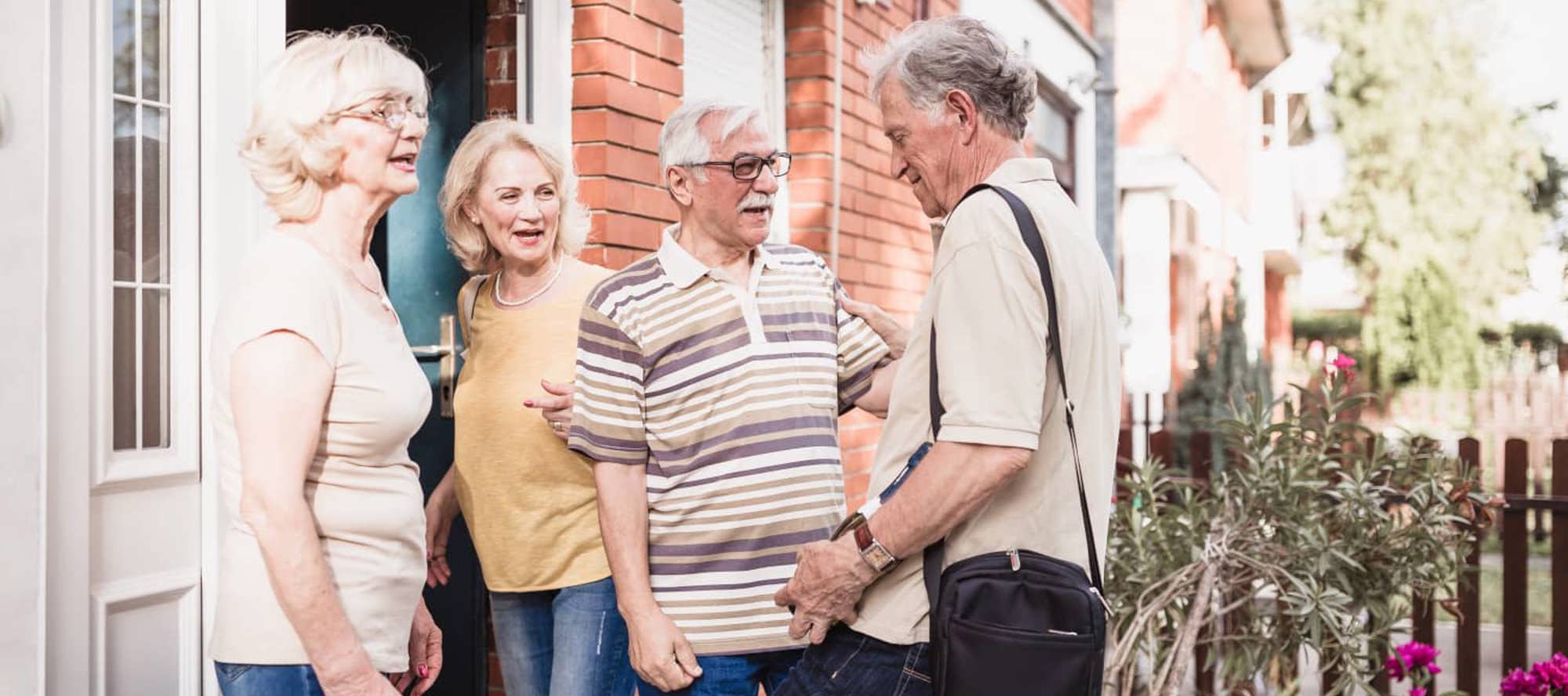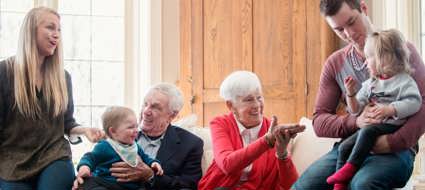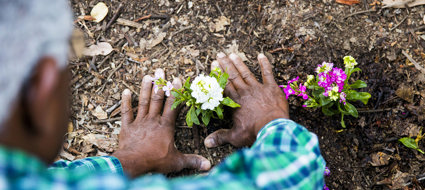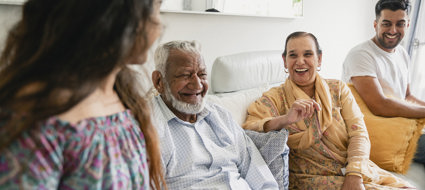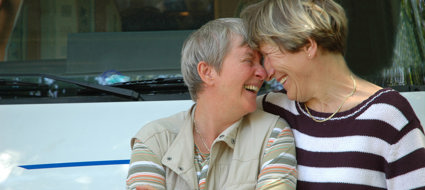Ageing well: Housing options and alternative modes of living for later life – Co-housing
Published:
This podcast explores co-housing as an alternative housing option in later life, considering how it can reduce loneliness and foster social connectedness, independence and community.
Mary Robson, Research and Development Officer at Research in Practice speaks to Hedi and Hilary from Older Women’s Co-housing (OWCH). They talk about the experience of living as part of a co-housing community at New Ground, a new purpose built block of 25 self-contained flats in North London.
This conversation offers unique insight into their experience of and journey to living in specialist housing, highlighting the untapped potential and opportunities of more innovative and under-utilised models of housing. The podcast accompanies chapter one of the Ageing Well: Evidence Review which provides an overview of the current and emerging issues in relation to housing, modes of living and care for a new and diversifying generation of older adults.
[Introduction]
This is a Research in Practice podcast, supporting evidence-informed practice with children and families, young people and adults.
Mary: Hello everyone and welcome to this Research in Practice podcast. My name is Mary and I'm a Research and Development Officer. Today we're going to be exploring innovative and specialised housing options for later life building upon our recent evidence review Ageing well – Housing options and alternative modes of living for later life which can be found on our website.
[Setting up Older Women’s Co-housing (OWCH)]
So, most older people in the UK live in mainstream single household housing but there is both room and a real need for more innovative specialised housing options that really meet the diverse needs, preferences and aspirations of people as they age. So, in this podcast we're going to be bringing to light some of the recent developments in alternative specialised housing and I'm really excited that today we're going to be speaking to Hedi and Hilary, members of OWCH or Older Women's Co-housing about their experiences of living at New Ground co-housing in High Barnet, London which is a development of 25 self-contained flats with shared communal facilities and gardens and which is the first senior cohousing community in the UK. So, Hilary previously worked as a theatre designer and spent the last 28 years of her career running the scene painting department at the National Theatre. She teaches scene painting at a college several times a year but is currently working in her studio developing her own artwork. She is 70 years old and has one relative, her brother, and joined OWCH (Older Women's Co-housing) about nineteen years ago. Hedi is nearly 92 years old and has lived in New Ground since its beginning in December 2016. She previously worked as a social worker and an author, editor of social work books which she is in fact still editing I believe. Hedi has two daughters, three grandchildren and is expecting a great-grandchild in the autumn. Hedi joined OWCH (Older Women's Co-housing) ten years ago when she was left on her own and searching for an alternative way to live independently without being lonely. So, welcome and how are you both today?
Hedi: Fine thank you. The sun is shining
Mary: Brilliant. Well, it's great to have you here. So, I guess, if you just want to start by telling us a little bit about OWCH or Older Women's Co-housing.
Hilary: We were set up by a couple of women who went to a talk by Maria Brenton about cohousing. Maria had been to Denmark and seen cohousing there which was fairly common and Shirley and her friend Madeline decided that's what they wanted to do for their old age. They wanted to live with a group of people in a village-like atmosphere and support each other as they aged. I think Shirley was in her early sixties at that point and she thought it would take about two years. It took nineteen years for it to happen.
There were a lot of obstacles, not least of which, how do you raise the money to actually build such a community as ours? So, we focused on actually building the community before we had a physical building which I think was a very good way around doing it and Hedi will talk to you about that. But when it came to the bricks and mortar, we couldn't get a bank loan against our properties. We also wanted to have a proportion of tenanted flats so that people who didn't own could actually live with us and live in a good way for ageing rather than it just being people who could afford to buy a property. That held us up too because that involved all sorts of government bodies and councils and it took a long while to actually find any way of actually getting a site and building a building. We had several sites during the years, often unsuitable ones for ageing. Down near the canal with a long walk to shops. We had certain things that we wanted. We wanted to live in London, we wanted to be able to access all the things that we like about London, theatres, museums, restaurants, friends. We wanted to be near a tube. We wanted to be within walking distance of shops because as you get older you do need these things. We needed not to be too far from doctors' surgeries. So, that meant it limited the sites and London is very hard because there aren't that many sites anyway and not necessarily suitable sites.
The closest we came I think while I was with OWCH (Older Women's Co-housing) was a site in Wembley where we were part of a bigger scheme, a commercial venture, and the planning office deemed the density of housing was too great so of course we were dropped. In that one we would have lived in a sort of tower block so actually I'm quite pleased. Although Wembley is probably a little more accessible to London than we are here we ended up with a much better site because we're a bit further out in High Barnet. The whole time we were trying to get a site and building our community we were supported by Housing for Women but they didn't have the resources to build for us so we needed to get someone else on board and in the end Hanover Housing Association came up trumps and they found several sites for us and this one in High Barnet which was an old school site. There wasn't a big school building, it was a series of small buildings and some quite temporary ones, and they found that for us and we agreed that it would be a good site. So, we have ended up with a decent size garden and flats looking over the garden which is really lovely and probably a bit better than a tower block to live in. We got a big grant from Tudor Trust to build the tenanted flats which helped enormously. I mean, Tudor Trust were with us from the beginning as well and they really supported us and they were marvellous actually. They really believed in it and encouraged us.
Hedi: That's very important because a vast amount of money is in play, much more than we thought at the beginning, solicitors' fees, everything costs more than you think it's going to cost at the beginning. So, I think it was very important that donation as it were, we've treasured the fact that that was there. But what was being done all the time that all this was going on, and it was an enormous amount of work for a very few people, we were trying to build a community because we wanted to move in as a community. We didn't want it just to be ad-hoc, a random selection of people. So, we met monthly, the second Saturday of every month and we slowly and over the years built a viable community and by that I mean that during that time Maria Brenton who stayed with us all the time as a, kind of, consultant and progress chaser, she was behind everything, during that time, during those nineteen years, Maria once said that she'd vaguely counted the number of women who'd come and gone and that's 200. So, that's an enormous amount of women who came and saw and then decided, you know, maybe not for them because co-housing isn't for everybody. It makes demands as well as gives an enormous amount. It demands that you contribute and that you contribute what you can contribute.
I mean, we have people living here with disabilities who clearly are very limited in what they can contribute but they do actually contribute enormously in just being here, in the way they behave, in the way they help other people by talking to them. There are lots of ways to contribute. But you need to want to do that, that's very important. It's not just a lovely place to live where there are friends for coffee and where you're never alone. You also contribute and that's the essence, you give and you take.
[Community and the building]
We have a saying that we don't look after each other, we look out for each other. For instance, Hilary is my neighbour, I have a window that goes out into a common corridor and if my blind isn't up certainly by midday there'll be a little phone call or a knock at the door or something just to say, 'Are you okay?' Nothing intrusive, it's never intrusive, it's just are you alright? So, there's no way, for instance, that one of us could be ill or something happen without other people knowing and doing something about it. But apart from that, if I want to work all day, I close my door, nobody will interrupt me, nobody will bother me unless I want them to. So, it's a way of being on your own, independent, because we're all very independently minded women here, on our own but not isolated. Never lonely, and there's a big difference between being alone and being lonely and I'd like to think that no one here is lonely. So, that's the community and we build the community even now. We have a pool of non-resident members who've been through the whole process of becoming members but there's nowhere for them to move into but they're part of our group, they come to events, they come to meetings, we meet them outside, they are full OWCH (Older Women's Co-housing) members but they don't live here. So, we are constantly building and wanting younger women to come and join us because the age balance we have to keep right and the diversity balance. So, women from all ethnic backgrounds, from all professional, non-professional, we want skills. We'd like a plumber to move in please. Over to you Hilary for the building.
Hilary: There's quite a lot of maintenance of a large building and we do have some problems with boilers and underfloor heating and dripping taps and these valves that they put on baths so you can't have a hot bath because we're so old and decrepit that we'd burn ourselves. It's those sorts of problems.
Hedi: I just had to pay £100 to finally have the valve taken off my bathwater which was put in when we moved in so that, you know, I wouldn't burn myself and I'm one of the few people with a bath and I want a hot bath.
Hilary: All our flats are wheelchair accessible. I mean, there'd be difficulties maybe going over a bumpy lawn but all the paths, even in the kitchen garden where we grow vegetables, we have raised beds that you can get around with a wheelchair. So, our bathrooms are wet rooms basically and even the ones with baths in are actually wet rooms so the baths could be taken out and it could be a shower put in. We are very much geared up to making life easy as we get older. I mean, I had my knee replaced and actually it was very useful having quite a large bathroom to get around in and I was in a wheelchair for a couple of days. So, that's the first thing I did. We have a wheelchair in a buggy store that you can use.
Hedi: Brilliant, communal wheelchair.
Hilary: Communal wheelchair, yes.
Hedi: Communal wheelchair, yes.
Hilary: That's the other thing. Yes, we do have communal stuff. One person had their hip replaced so we have the thing that you put over the toilet where you can push with your arms to raise yourself up. Mind you, I'm making us feel very old, aren't I?
Hedi: No, I think we ought to say at this point while we're talking about our health that although this is called a project for older women in the five years that we've been here we have not made one referral to social care. When you sent us the template for this podcast and you kept asking what's the relationship with social care and how did we find social care, we have to say we don't know because we've not done it. We have maintained our own health and we have made less demands on the local council than we would have done if we'd each been in our own flat somewhere.
Hilary: Yes, it was one of the things that Barnet Council said to us when we got the site was, 'You'll need social services. Go and see social services.' We said, 'No we won't.' We went to social services because we had to because Barnet Council wouldn't give us planning permission and they said, 'Yes actually, we can see you won't need us so go ahead.' So, we got planning permission but it was one of their big concerns, the council, was that we would drain their resources which they don't have. Even people coming out of hospital get cared by us so they need a lot less help so it is a good way to live because you're being helped by your friends as well rather than by people you don't know.
Mary: That sense of community really comes through. I remember you saying last time we spoke that that was more important than the bricks and mortar almost, the community was central.
Hilary: Yes, much more important.
Hedi: It is more important yes. I mean, it is much more important, yes. I wondered if you'd like Hilary to mention mistakes that we did make, like, the automatic doors that we then had to come back on.
Hilary: Yes, yes. We wanted a building, I mean, we wanted a modern building for a start. We wanted a building with big windows and we got this beautiful building with really large glass doors which were too heavy for us to open so we've actually automated. Since we moved in, we've automated all the doors so that, you know, you can open them. I mean, we could open them but it just was a bit of a struggle and when you had shopping it was difficult. It has made life a lot easier and also for anybody who comes in and does things, like the gardener, he can get through the doors easily because he just presses a button and pushes his big lawnmower through.
Hedi: I mean, that was something that people thinking about this sort of housing, it's very important. If we had thought about it before we moved in, if we had insisted, even if it was going to be an extra cost, that we had to have automated doors it would have cost less than it did after we moved in.
So, those sorts of things you learn by making mistakes but you can learn from other people's mistakes and we are very keen that people should learn from for instance.
Hilary: We've got flat flushes on the toilets which you have to push with your finger as well. It's fine for me, I'm quite strong but if your arthritic thumbs and fingers, they're really difficult. So, it was interesting actually the things that we missed and, you know, didn't think about before we moved in partly because we had no experience of them. We had about four workshops with the architects because Pollard Thomas Edwards are very keen on working with their clients and they arranged these workshops for us where, the first one, we looked at the site and we were divided into three groups, each with an architect, and we looked at the plan for the site and then we had cut out building shapes that we then placed on the plan, and the three groups came up with a different arrangement which were all actually very similar in the end. The architects went away and worked on that and then came back to us with the three shapes and we had another workshop in which we looked at those and decided on the one that was best and then it was, how do you arrange the flats within that? Then we had another workshop which I think was about fittings and the arrangements inside the flats. So, I mean, they were marvellous. We worked with them and I think they enjoyed it and we certainly enjoyed it and it means we feel we own the building because we were part of that whole way of designing it.
Hedi: Each flat is different, isn't it?
Hilary: Each flat.
Hedi: Each flat is different. Although, you know, there are 25 flats here and they're one, two or three bedrooms. There are only three three-bedroom ones, most of them are two-bedroom, some are one-bedroom. Each one is different and it's always a joy to come into somebody else's flat and see the difference and just say, 'Ah you've done this and I've done that and that colour and this colour.' Because we chose our own colour schemes as well and our own floor coverings and even our own door handles, didn't we?
Hilary: Yes, yes.
Hedi: So that each flat really is very individual and that's fun.
[Learning for future projects]
Mary: Brilliant and you're all invested in the project as a collective but also individual space as well. It sounds fantastic. You mentioned sharing learning and learning from mistakes, is there anything that you wish you'd known that you think our listeners or anyone who's aspiring to live in cohousing might be helpful for their journey?
Hedi: I suppose I would say that it brings enormous rewards, more than maybe you even thought it would and more work from you than you even thought it would.
Hilary: Yes, I mean, we have quite a large number of task groups who meet regularly. We have finance, we have a buildings team, we look after maintenance because a building like this, you know, none of us had ever run a large building and we have a lift so the lift has to be serviced every few months. We have to have a fire risk assessment every so often.
We actually have a team that test the fire alarms once a week which saves us getting someone else in to do it so that saves us money. But once a week you have to test all the fire alarms and then record it. We have to have all the gutters cleaned regularly. What else do we do?
Hedi: We have to deal with pigeons and foxes.
Hilary: Yes, yes.
Hedi: We welcome wildlife, adopt pigeons and foxes.
Hilary: We do, we like pigeons and foxes but I don't like the foxes digging all my beans up.
Hedi: Or the pigeons messing all the window sills.
Hilary: Yes, I mean, there's communal, you know, that we have common space and a guest room so all the maintenance of those two areas go to the buildings team. We have a laundry. Nobody has to have their own washing machine, we do have washing machines and dryers and a very nice drying area actually that was where the council insisted that we had something like 30 bike stands which as there's only two people who ride bikes was a little excessive. But it's made a perfect undercover drying area for all the washing, something we'd never have thought of is an undercover drying area.
Hedi: All the task groups are brought together by a management committee which is voted for once a year which, again, in turn reports to a communal business meeting, a community business meeting, which happens like it did before we moved in, which happens once a month, still the second Saturday. That is still the absolute basis of cohousing where the decisions are made, where everybody contributes, where it operates by consensus which is very, very wearing sometimes. It takes a long time to get to a decision but when a decision is made it is everyone's decision, everybody has participated and we do have fun don't we Hilary. We have fun.
Mary: I was going to say, I watched a video on your fantastic website, I love the website, and it looked like you have some great activities and lots of things going on there.
Hedi: Yes, yes. When we didn't have the pandemic, from the day we moved in we had a weekly communal meal on a Friday or a Sunday and took it in turns to cook. Took it in turns to wash up afterwards.
Hilary: We do have two dishwashers though.
Hedi: We do have two dishwashers yes.
Hilary: Essential.
Mary: Absolutely.
Hedi: We have a big lovely communal kitchen.
Hilary: It's a domestic kitchen though. It's interesting because one co-housing group who gave us advice said don't put a domestic kitchen, get a professional one. But we had to meet all sorts of regulations if you had a professional one. In fact, we do have two domestic ovens, two domestic hobs and we have managed with that actually quite well.
Hedi: Yes, absolutely.
Hilary: I mean, people sometimes cook things in their flats as well. When all the people who are here for Christmas have Christmas dinner together and their families come as well or friends and in that case we do need more ovens and there's things being cooked all over the community and then taken to the dinner.
Hedi: The common house is used for all kinds of things like films, we show films once a week usually, for meetings of all kinds, for parties.
Hilary: Play readings.
Hedi: Play readings, yes. All sorts of things that go on, it's a nice common house.
Hilary: There's lots of different exercise groups.
Hedi: Yes, exercise groups of various kinds, yes, yoga.
Hilary: Or just meeting to have a cup of coffee.
Hedi: Yes.
Hilary: Quite often people just sit there or there are books you can sit and read, you know, it's just a social area outside of your own flat.
Hedi: It's a hub where, you know, things happen.
Hilary: We deliberately sited it by the front door so you go past it when you come in. So, in fact, you can be enticed in, it can sometimes take quite a while to get to my front door because I get enticed into something and end up having coffee and a conversation.
Mary: That social side must be so brilliant, you know, always having someone to talk to.
Hedi: If you want to.
Hilary: If you want to.
Mary: Exactly.
Hedi: If you want it.
Hilary: Occasionally people put a sign on their door, you know, today don't disturb me because I'm doing something like FaceTime to Australia and so I don't want a visitor.
Hedi: Another time you'll see a notice on a door that's been closed all day and the blind down but there's a notice saying I am well thank you so nobody need worry about you.
Hilary: Yes, we did invent a little card scheme didn't we for somebody who put in every day, okay visit now, don't visit, when they weren't well and were getting rather too many visitors because it can be a bit overwhelming if you're not well suddenly everybody will arrive with food or help.
Hedi: Of course, we have fun in the garden too. We have a very big garden; it is absolutely beautiful. There are about three or four women here who are expert gardeners including Hilary and they've made-, it's just lovely. It is really, really lovely and the rest of us, kind of, do what we can, a bit here and a bit there but the garden group, it's just gorgeous. So, lots of things go on in the garden, birthday parties unless it's pouring with rain and just, I don't know, we'll have a picnic or we'll do this or that but the garden is the most lovely communal space.
Hilary: Very useful during COVID.
Hedi: Oh, during COVID, I mean, because we could meet outside and have a chat or have a meeting outside. Better than Zoom really.
Mary: Yes, definitely.
Hedi: We actually have a garden house as well. We have two parts of the garden. We have our big lovely ornamental garden with a lawn and beautiful flowers and then it goes through into I suppose what would you call a kitchen garden. We call it The Orchard actually because it has fruit trees but that's where we grow vegetables which we share. But that has a little house in it too, a garden house, with a tap and a loo where we can make tea and coffee and get out of the rain.
Mary: Yes, and it's architect designed.
Hedi: It's architect designed and it has a new little pond in front of it and that's been a haven during the pandemic because we've been able to see our bubbles, our closest friends, in the garden, sit outside the little garden house, look at the pond and it's been wonderful. During the pandemic we haven't had one single case of coronavirus, we've kept ourselves safe. We've sanitised twice a day, we've kept to the rules, we haven't had meetings except on Zoom or in the garden and we've kept ourselves safe.
Hilary: But not been isolated.
Hedi: Not been isolated.
Hilary: In the way we would have been if we'd have been in our home individual flats or houses where we lived before because, for instance, most of my friends lived a long way away from me. Where I was before I only had one friend who lived next door so it would have been a very different experience. Whereas here I felt I could carry on with my life fairly normally apart from not being able to get too close to people and not being able to meet indoors.
Mary: Anything that you think are important bits of advice that anyone who might be aspiring to live in cohousing or thinking about that as an option for later life?
Hedi: Well, from the point of view of the structure of the community rather than the building, I would say at every point make sure you're not going to be done unto, that you're going to be doing the doing.
Hilary: Yes, very important and that if you want to remain active and to be in control of your life then this is a very good way of doing it. But if you really don't want to participate and work basically for your community then it's not a way of life for you. So, you have to, as Hedi said earlier, you do have to participate and work for the community and make it happen. It doesn't happen automatically.
Hedi: Though there can be days when you can meet somebody and say how are you and they say, I've had enough, I've been OWCH-ing all day.
Hilary: Yes, we do have to get a life balance.
Hedi: Unless the desire for a different way of life and an independent way of life which is yet communal, and it's quite a strange concept, unless that of itself appeals to you I don't think I would ever suggest to somebody have you ever thought of co-housing. Because unless you somehow come to it through your own personal redevelopment etc, and I don't mean that you've got have a philosophy or god knows what, I mean you can do what I did which was pick up a leaflet in the library about it and I read it and I thought this is what I've always been looking for.
[Advice for adult social care]
Mary: How can people working across adult social care best offer support or advice to anyone who might have aspirations to live in cohousing?
Hilary: I think it is to tell them that it isn't just that you move in and are looked after. That it is a participatory thing as Hedi was saying. But, I mean, it keeps you going. They say people in cohousing don't die, you certainly don't die of loneliness anyway.
Mary: In an ideal world what might housing options look like in later life and what needs to change to make this happen?
Hilary: Governments need to put money into cohousing groups because it's still very difficult I think to actually get land and build and it is a way of saving money actually in the end but it's not supported in the way it is in countries like Germany and Denmark and a lot of the Scandinavian countries.
Here it's a, sort of, unknown. I mean, I had friends who said you're mad. You'll all fall out, you won't get on, you know, it'll be dreadful and now they're quite envious actually in many ways. It's like they phone me up and say oh no I can't do that day because I'm doing this and then I can't do that, no maybe next week or maybe the week after. I'm so busy.
Mary: Fantastic. Is there anything else important that you'd like to share with us?
Hedi: Well, I suppose, because we've stressed hard work and it is hard work but you're always doing it with somebody, that's another thing. You are not struggling on your own, you're doing it with somebody. There is the building group, there's the maintenance group, there's the finance group. If we haven't got enough money for something you're not banging your head against a wall and wondering what to do. There is a group of people dealing with everything.
Hilary: There's always somebody to do things or if I can't get out and get something someone will go for me. There's always somebody who can do something that I can't or that I need some help with. If my computer goes down there's someone here who knows a bit more about it than I do and can help me. So, it's great because it is that sharing.
Hedi: But we do need a plumber.
Mary: Call out for a plumber.
Hilary: Yes, female plumber, over 50 please.
Hedi: We cannot find a carpenter.
Hilary: Yes, carpenter, electrician might be useful.
Mary: Well, it's been really informative and inspiring to speak to you both and, yes, thank you so much for your time and sharing your insights and experience with us, it's been fantastic, thank you.
Hilary: You're welcome, thank you.
Hedi: Thank you, it was nice talking to you.
[Outro]
Thanks for listening to this Research in Practice podcast. We hope you've enjoyed it. Why not share with your colleagues and let us know your thoughts on Twitter? Tweet us @researchIP.
Talking points
This podcast looks at:
- The journey and development of New Ground co-housing.
- Creating and building a co-housing community.
- Day to day life at New Ground co-housing.
- Reducing loneliness and fostering social connectedness.
- Keeping safe during COVID-19.
- Co-housing, independence and self-sufficiency in later life.
Resources mentioned in this podcast
- Ageing Well: Evidence Review - Introduction
- Ageing Well: Housing options and alternative modes of living in later life (chapter one)
Reflective questions
Here are reflective questions to stimulate conversation and support practice:
- What alternative housing options are there in your local area?
- What are the main benefits of co-housing?
- Do you explore alternative housing options with the older people you work with?
- What are the key messages from the podcast and how could these support you to think differently about housing options in later life?
Professional Standards
PQS:KSS - Effective assessments and outcome based support planning | Person-centred practice | Direct work with individuals and families | Developing confident and capable social workers
CQC - Effective
PCF - Knowledge
